
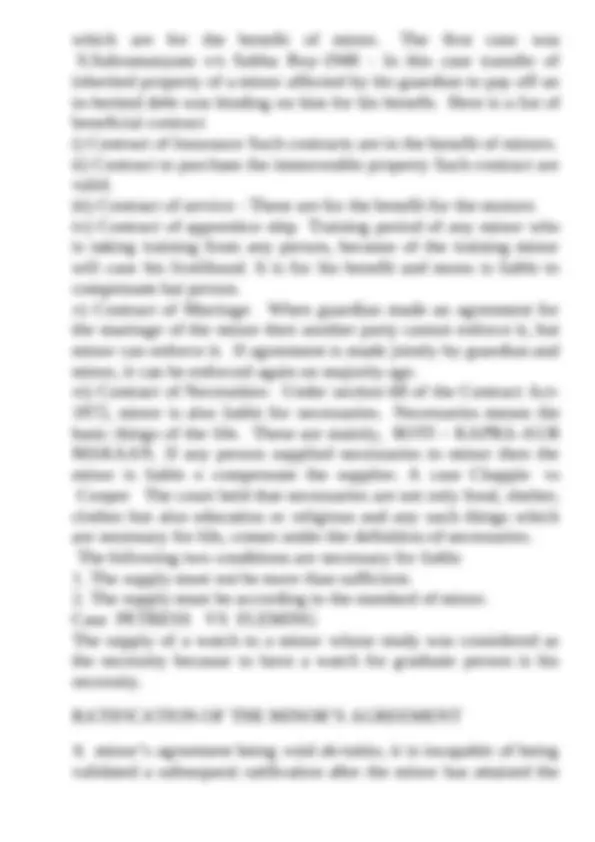
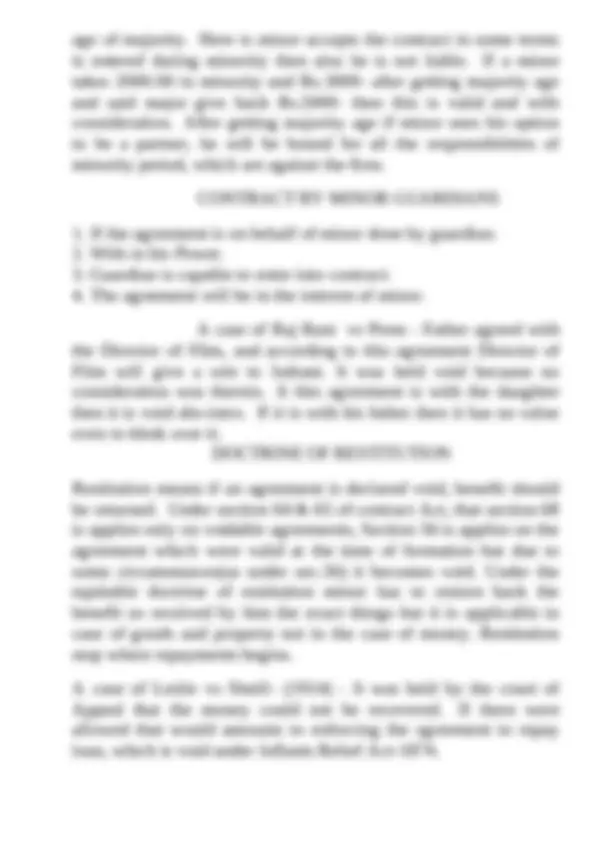
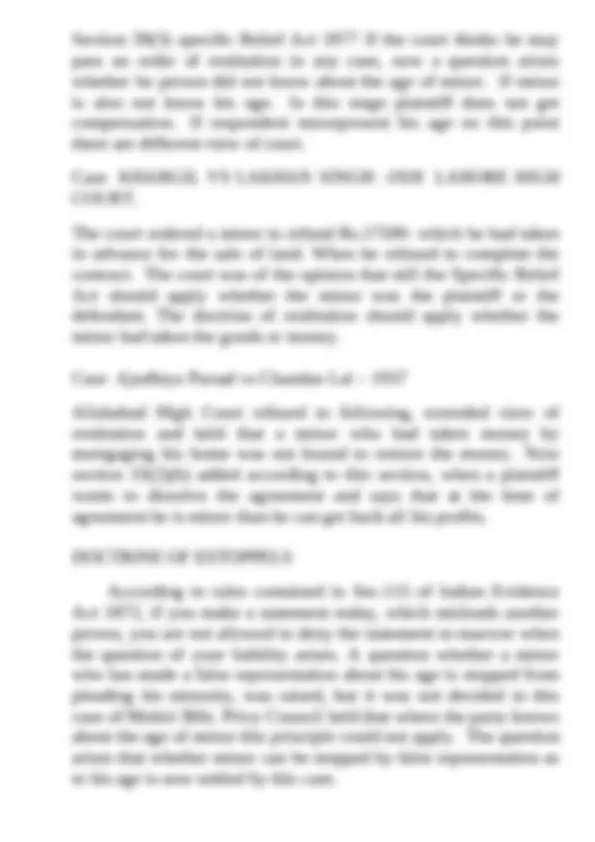
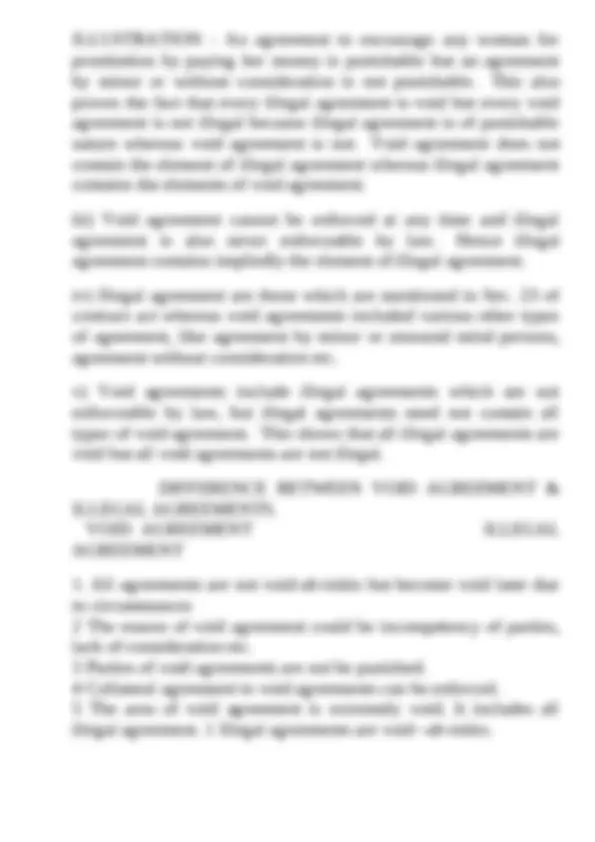
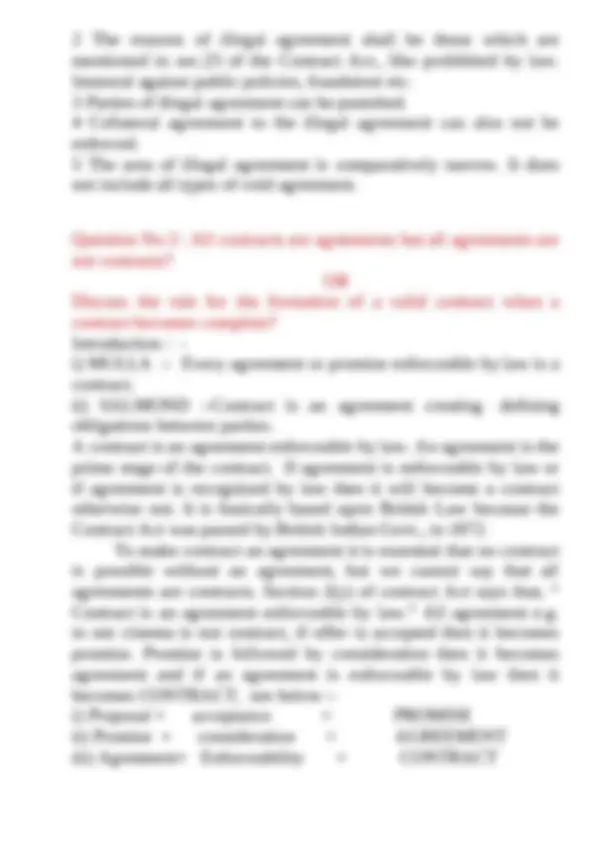
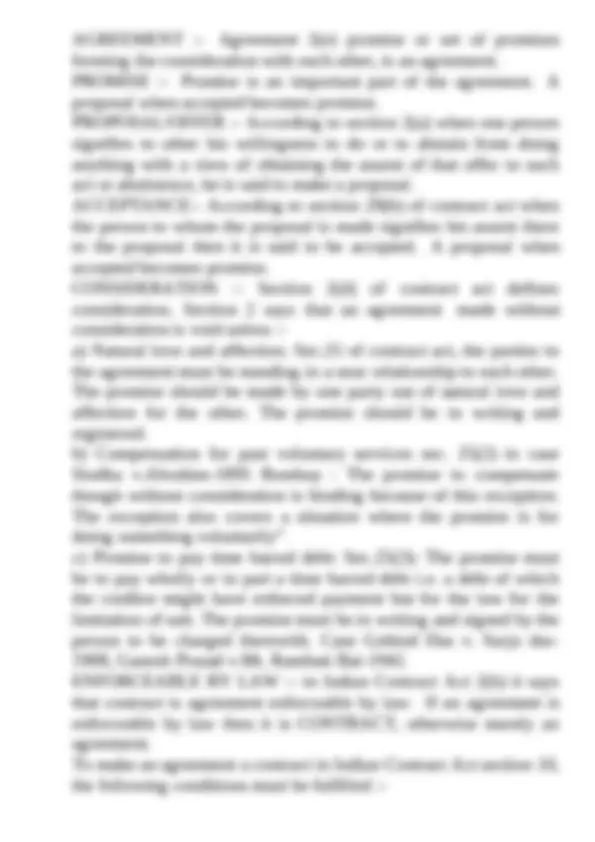
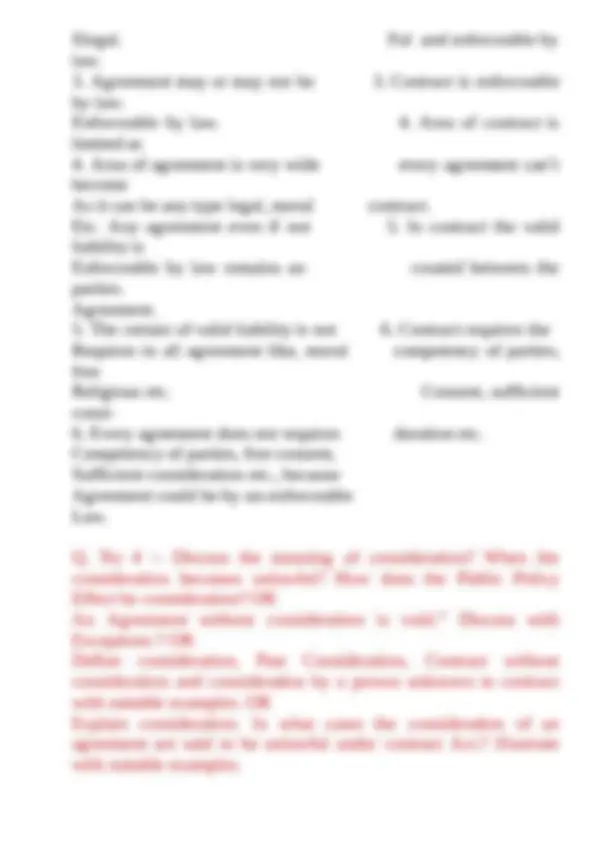
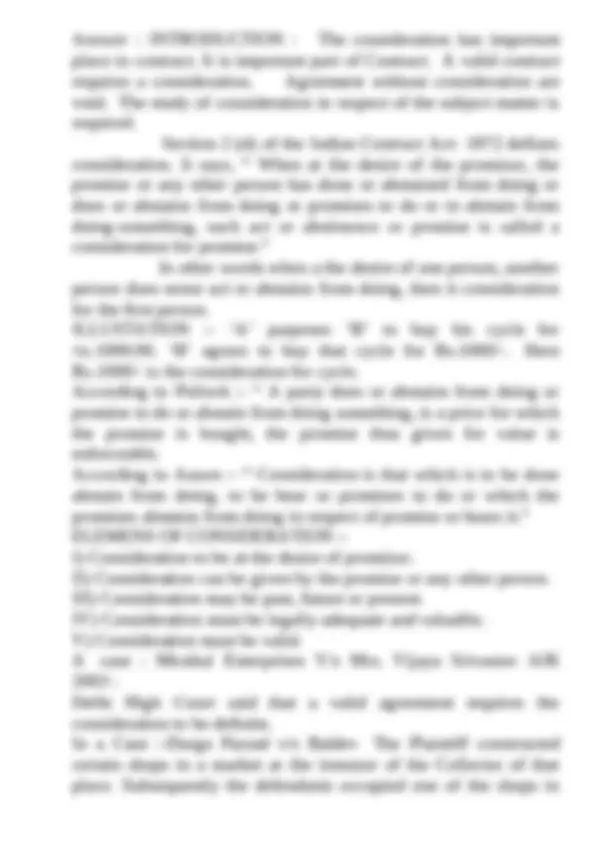
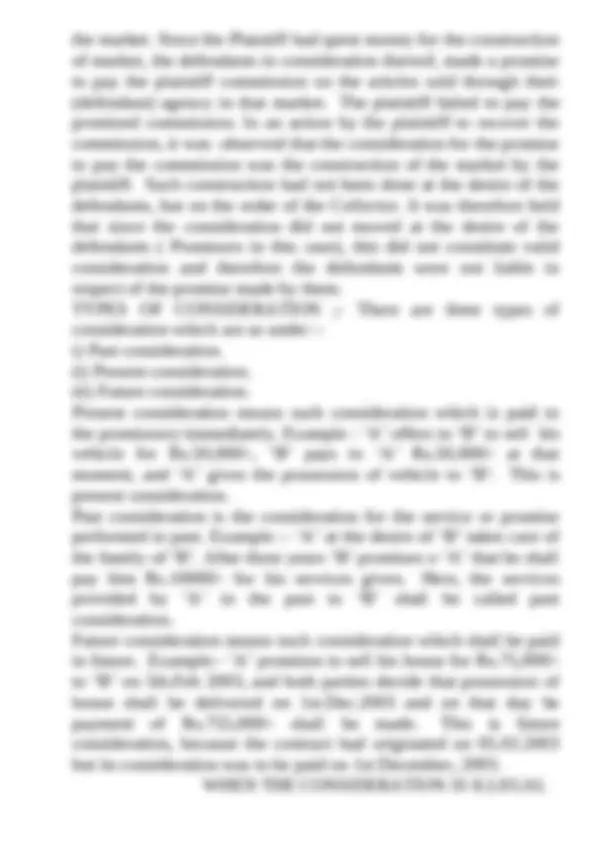
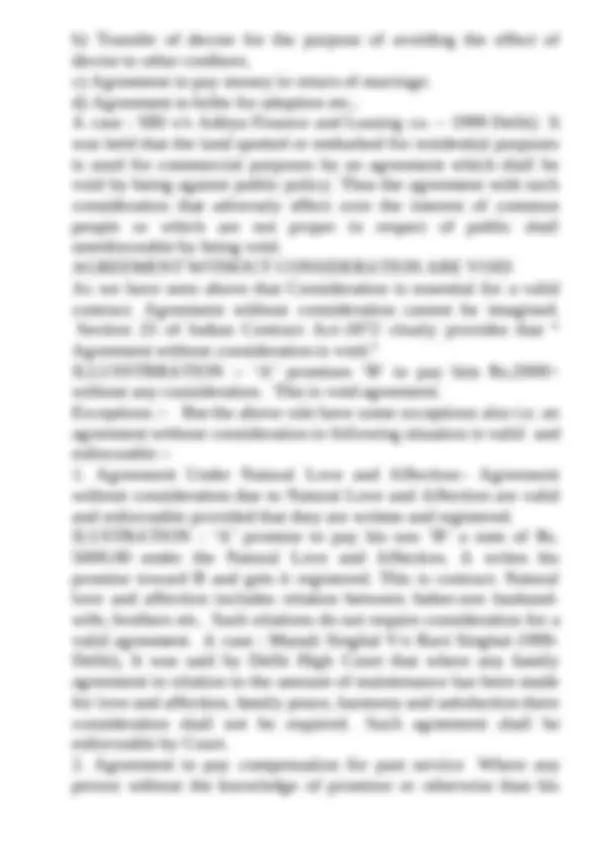
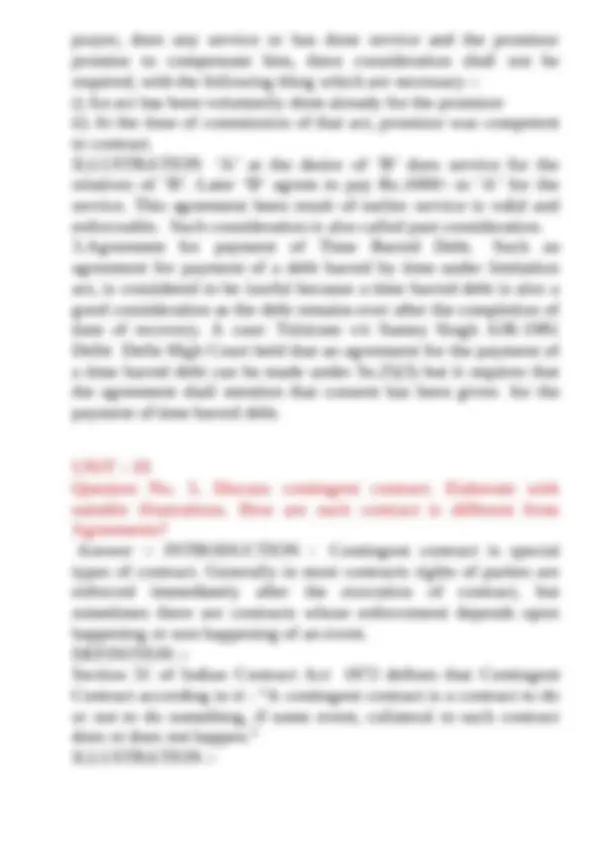
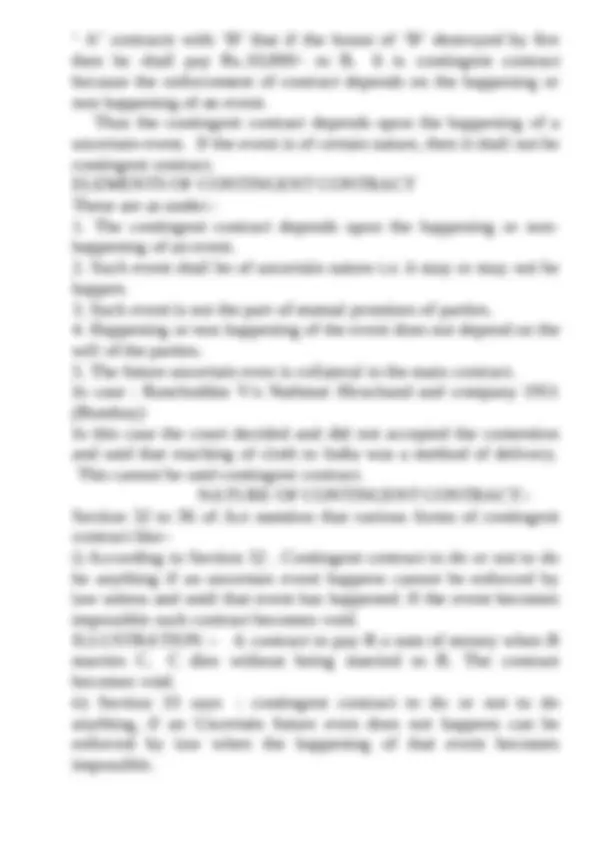
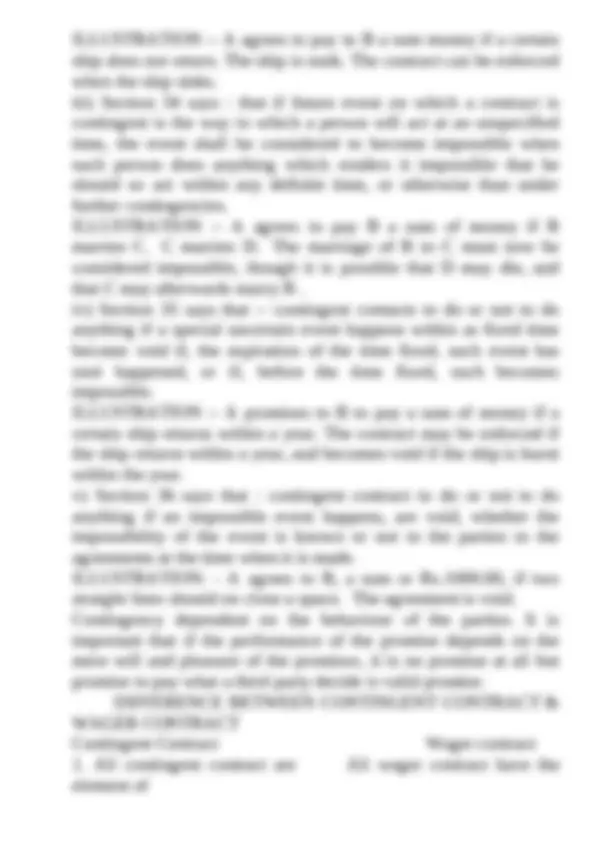
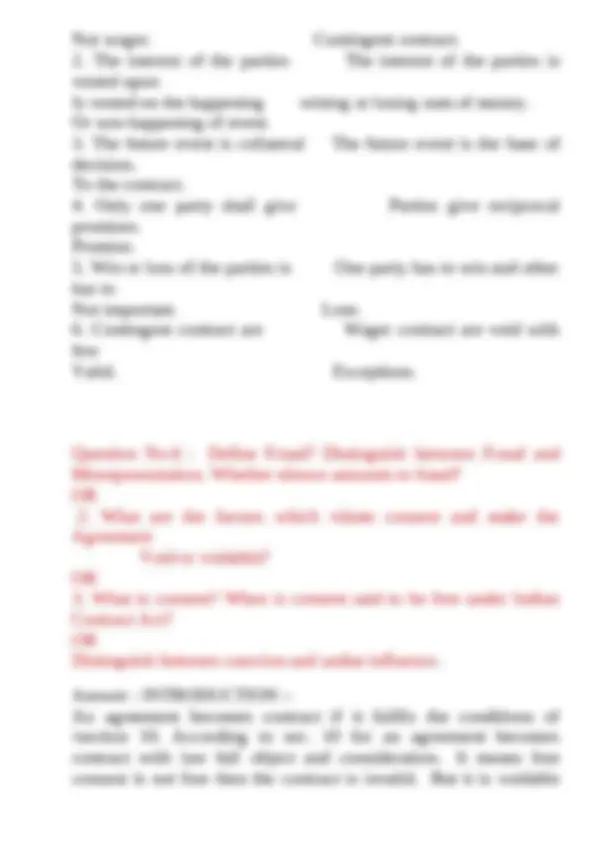
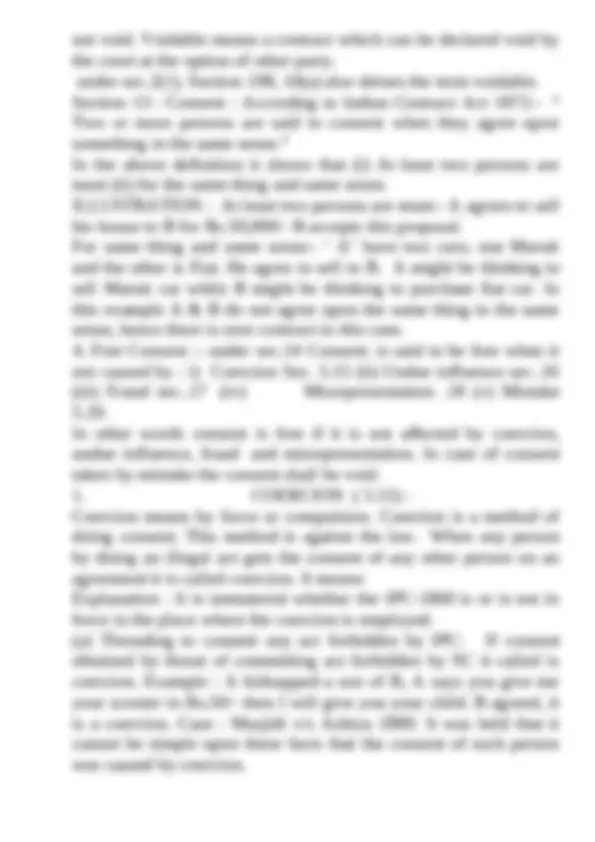
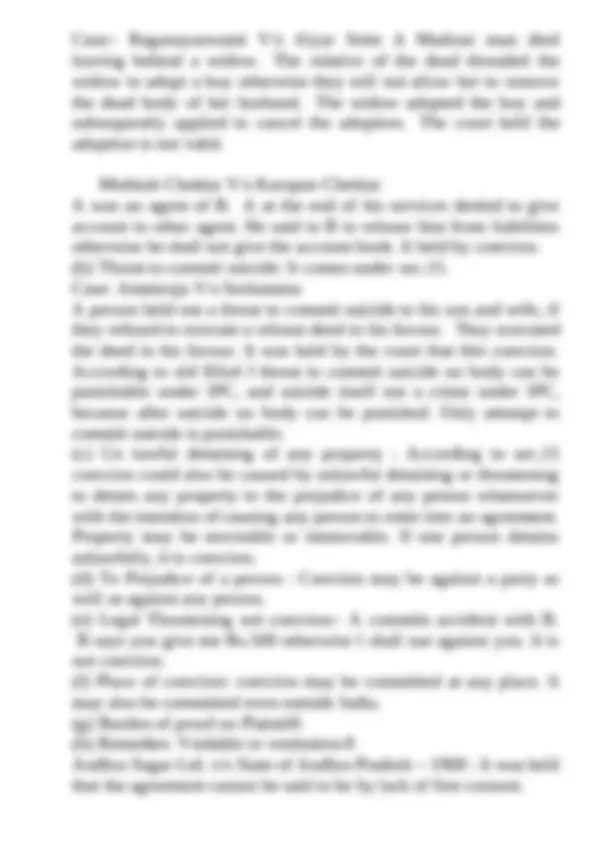

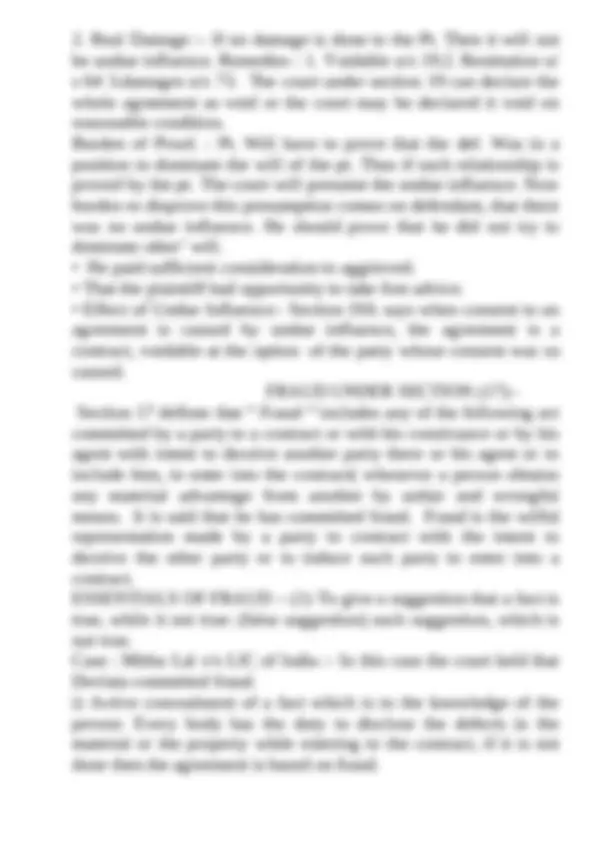

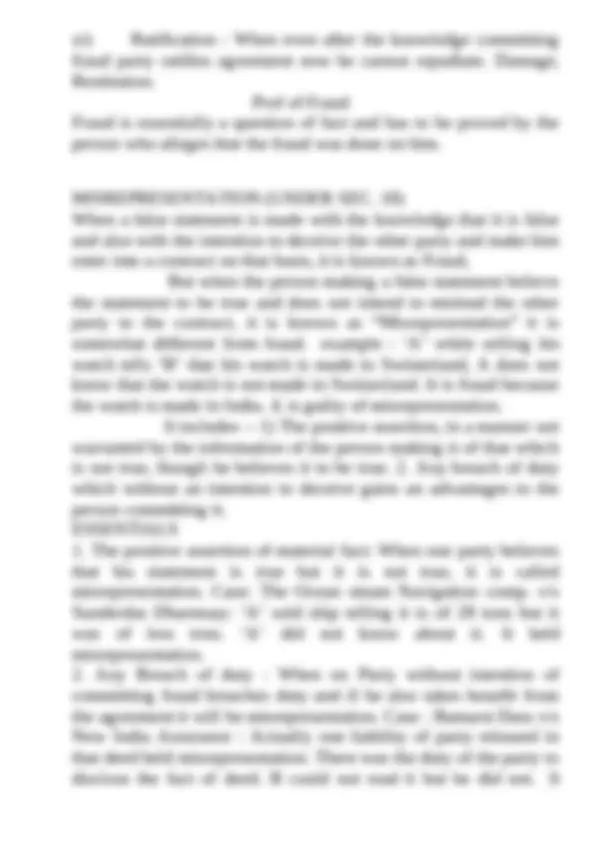
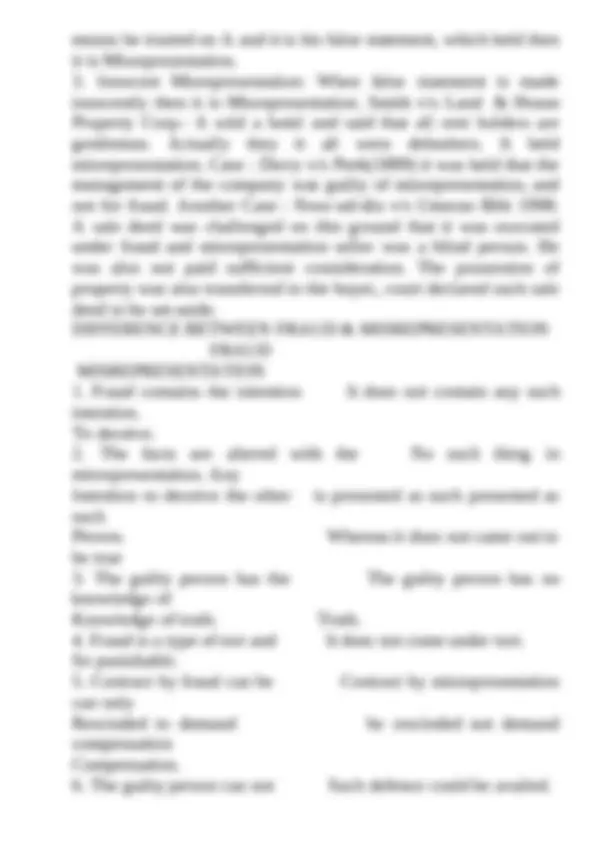

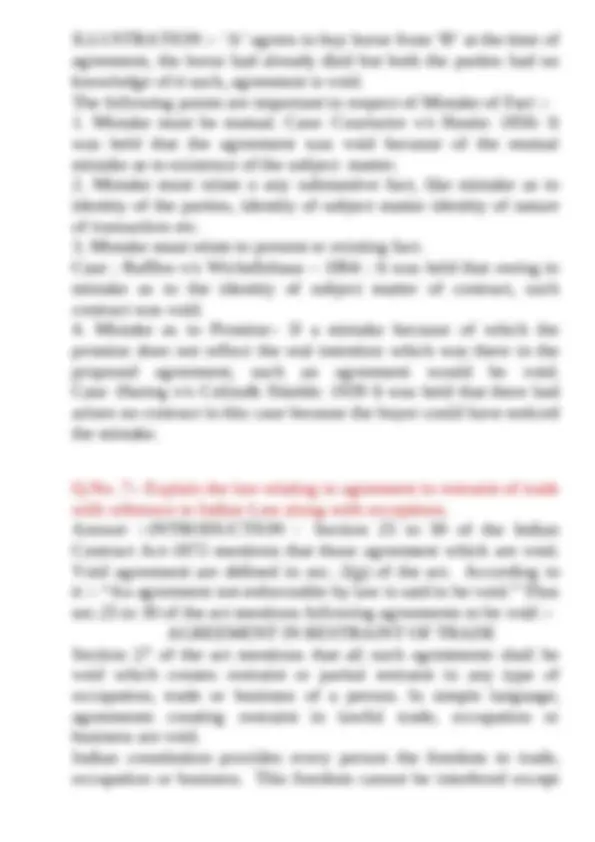
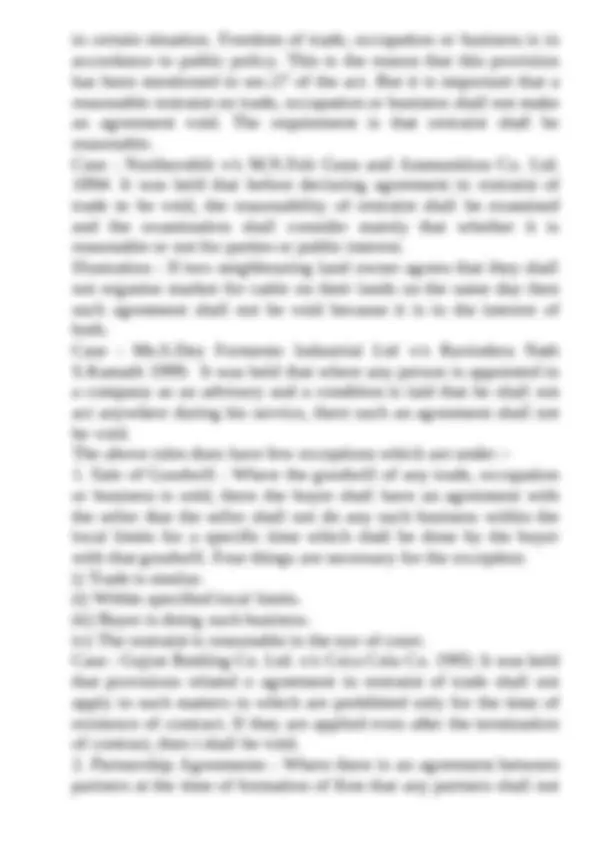
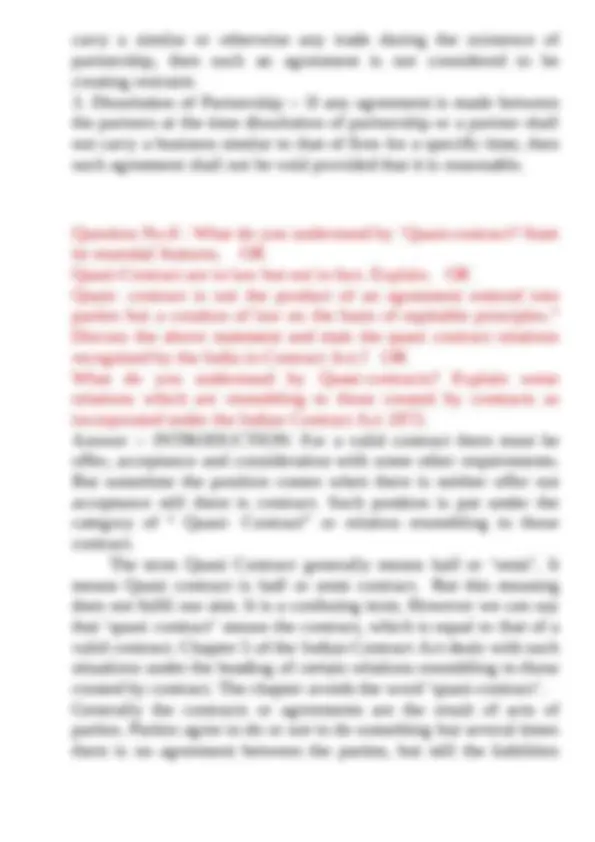
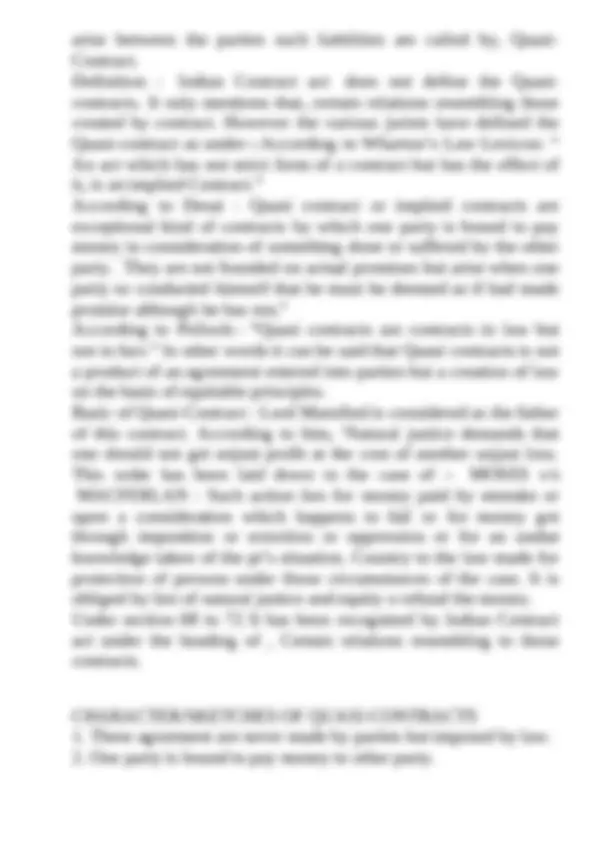
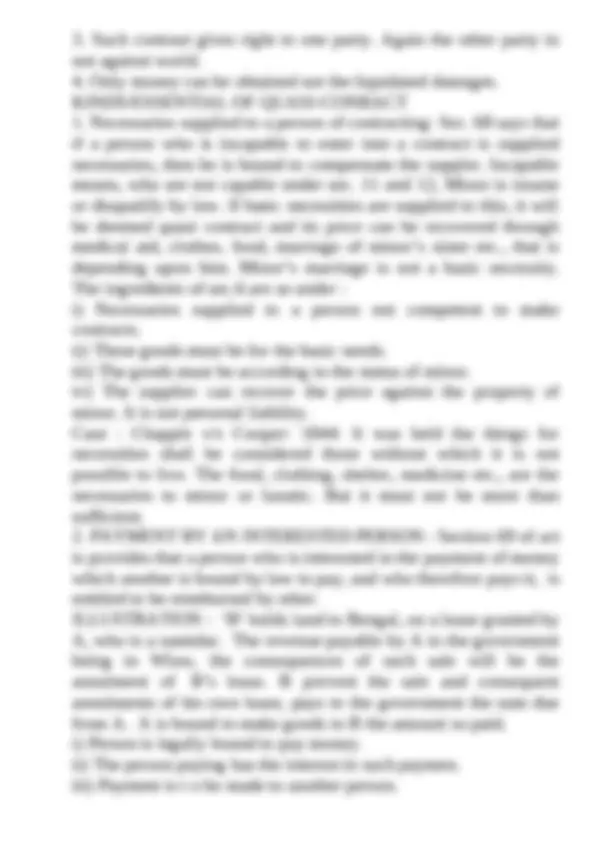
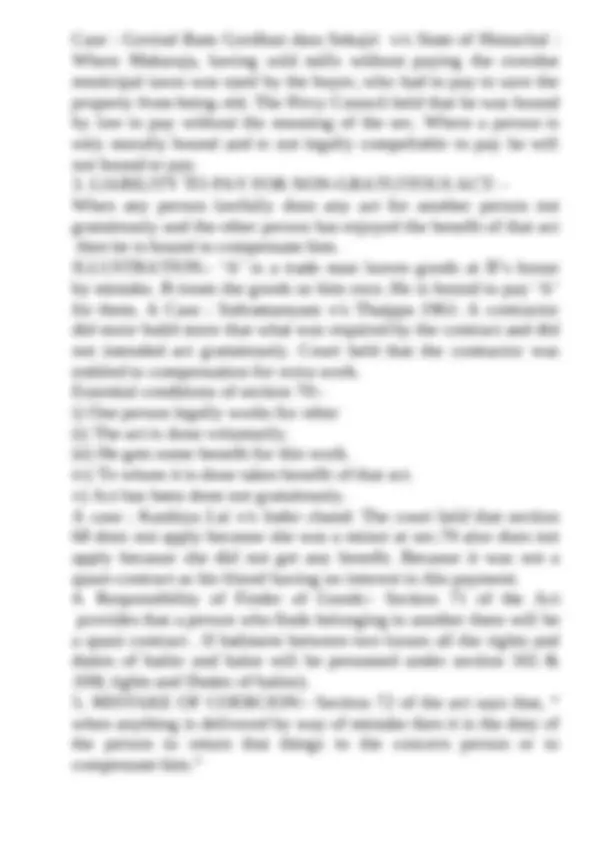

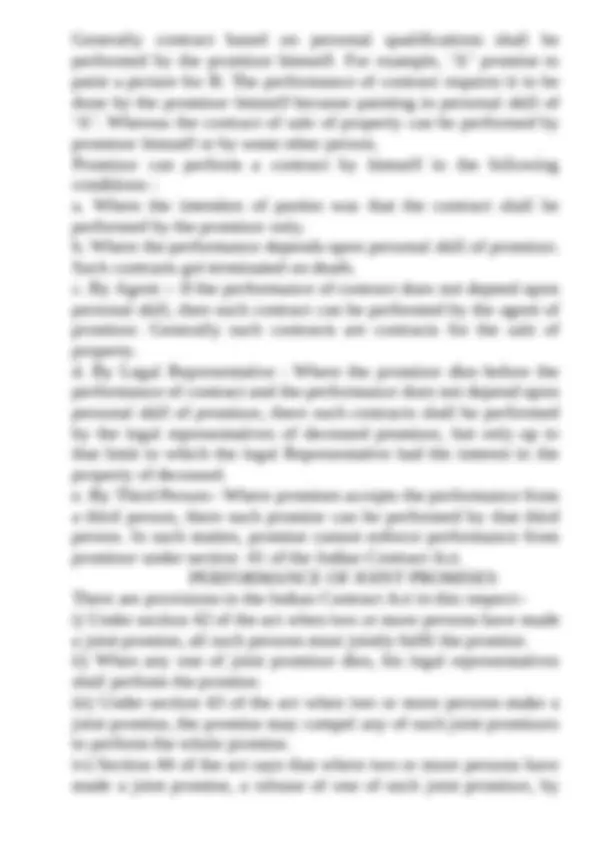
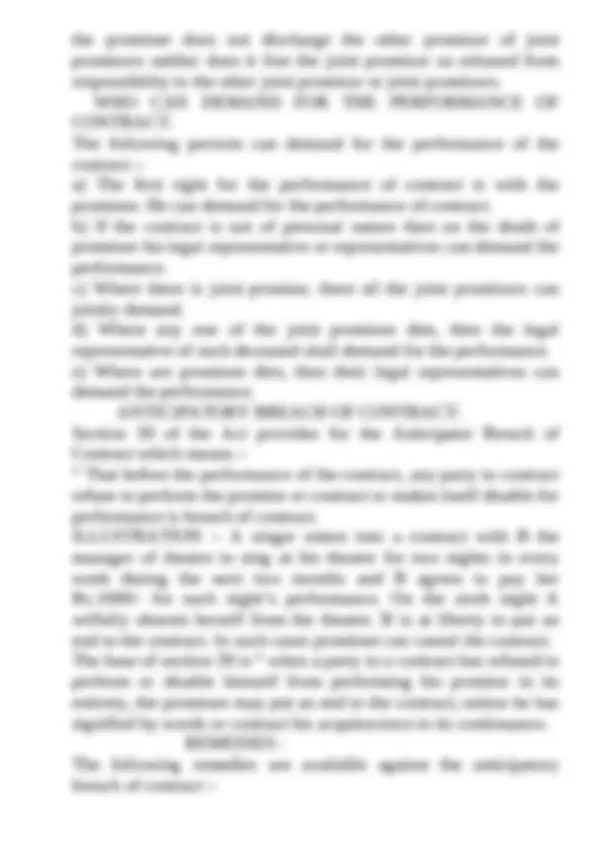
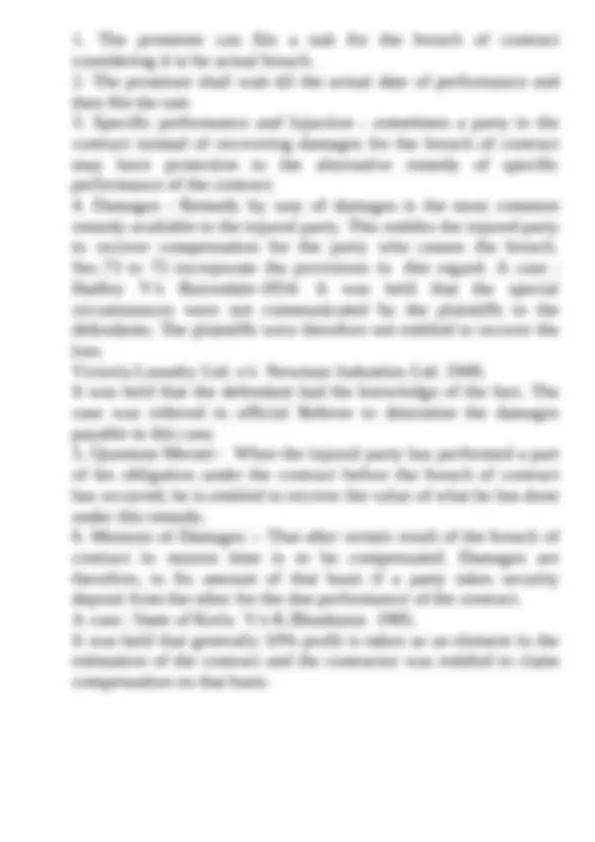


Study with the several resources on Docsity

Earn points by helping other students or get them with a premium plan


Prepare for your exams
Study with the several resources on Docsity

Earn points to download
Earn points by helping other students or get them with a premium plan
Community
Ask the community for help and clear up your study doubts
Discover the best universities in your country according to Docsity users
Free resources
Download our free guides on studying techniques, anxiety management strategies, and thesis advice from Docsity tutors
LAW OF CONTRACT NOTES According to section 11 of Indian contract Act 1872 which provided, “That every person is competent to contract who is of the age of majority according to law to which is subject and who is sound mind and not disqualified from contracting by any law to which he is subject.
Typology: Exams
1 / 40

This page cannot be seen from the preview
Don't miss anything!

































Question No. 1: Who is competent to contract Discuss the law relating to minor’s agreement in India, with help of decided cases. Also brief about English Law Indian law in this context. OR Minor’s agreements are void at-initio. In which case the above rule was established. Discuss in brief that case and also bring out the exceptions to the above rule. OR What do you understand by “ capacity to contract” What is effect of Minor’s agreement and when can it enforced. OR “A minor’s bind others but is never bound by others.” Explain by giving illustrations. OR Discuss the nature and effects of Minor’s Agreement. Answer – INTRODUCTION:- All agreements are not contracts. Only those agreements are contract which fulfil he conditions of section 10 and according to section 10 for a contract parties must be competent, the consent must be free. Therefore, the competency of the parties to a contract is most essentials element of a contract. According to section 11 of Indian contract Act 1872 which provided, “That every person is competent to contract who is of the age of majority according to law to which is subject and who is sound mind and not disqualified from contracting by any law to which he is subject.” The following persons are competent to contract - i) Who is major. ii) Who is of sound mind. It is evident that minor’s and unsound mind person cannot make a contract. A Major person means who has attained the age of 18 years. The age of majority has been decided by Indian majority act
“An agreement made by a minor is void.”, from the above statement we find that the minor is not competent to contract. Indian contract act is silent about whether it will be void or voidable up to 1903. But it is decided by the Court that these are void. Agreement by a minor is void-ab-initio, such contract cannot be enforced by law. Further the minor cannot authorise any other person to do a contract. Case Mohiri Bibi vs Dharamdass Ghosh (1903) A minor Mr. Dharamdass Ghosh executed a mortgage documents for Rs.20,000.00 in favour of a money lender Sh. Brahmo Dutt. The money lender actually paid Rs.8,000.00 to the minor. It is important that before this transaction the guardian of the minor informed the Attorney of Money lender that he (Dharamdass Ghosh) is minor. Later on a suit was instituted by the minor Dharmadass Ghosh against the money lender Sh. Brahamo dutt with the intention that the mortgage be set aside. This suit was opposed by Money lender by saying that the above contract being voidable, he has the right to receive the amount of the loan under section 64 and 65 of Contract Act i.e. minor is bound to return back the amount. Privy council held that,“ the contract is void ab-initio which cannot be enforced.” It was also held that the minor could not be asked to repay the loan taken by him. It was further held that law of estoppels cannot be applied against the minor Shri Dharmodas Ghosh being mis-stated falsely his age because he was minor at the time of the agreement and the agreement was void. The law of estoppels as stand in section 115 of Indian Evidence Act was not applicable to the present case as the plaintiff was minor at the time of making agreement, this fact was also known to the agent of Brahmo Dutt defendant. Under Specific Relief Act 1877 Section 38 and 41 applies where party had the knowledge of minority age gets restitute degree. A new concept of beneficial has come into existence now. It has been held in various cases. A minor is bound for the beneficial contract. The beneficial contract are those contracts
age of majority. Here is minor accepts the contract in some terms is entered during minority then also he is not liable. If a minor takes 2000.00 in minority and Rs.3000- after getting majority age and said major give back Rs.5000- then this is valid and with consideration. After getting majority age if minor uses his option to be a partner, he will be bound for all the responsibilities of minority period, which are against the firm. CONTRACT BY MINOR GUARDIANS
Section 39(3) specific Relief Act 1877 If the court thinks he may pass an order of restitution in any case, now a question arises whether he person did not know about the age of minor. If minor is also not know his age. In this stage plaintiff does not get compensation. If respondent misrepresent his age on this point there are different view of court. Case KHARGIL VS LAKHAN SINGH -1928 LAHORE HIGH COURT. The court ordered a minor to refund Rs.17500- which he had taken in advance for the sale of land. When he refused to complete the contract. The court was of the opinion that still the Specific Relief Act should apply whether the minor was the plaintiff or the defendant. The doctrine of restitution should apply whether the minor had taken the goods or money. Case Ajudhiya Parsad vs Chandan Lal – 1937 Allahabad High Court refused to following, extended view of restitution and held that a minor who had taken money by mortgaging his home was not bound to restore the money. Now section 33(2)(b) added according to this section, when a plaintiff wants to dissolve the agreement and says that at the time of agreement he is minor than he can get back all his profits. DOCTRINE OF ESTOPPELS According to rules contained in Sec.115 of Indian Evidence Act 1872, if you make a statement today, which misleads another person, you are not allowed to deny the statement to-marrow when the question of your liability arises. A question whether a minor who has made a false representation about his age is stopped from pleading his minority, was raised, but it was not decided in this case of Mohiri Bibi. Privy Council held that where the party knows about the age of minor this principle could not apply. The question arises that whether minor can be stopped by false representation as to his age is now settled by this case.
v) Which do not create valid (illegal) liabilities between the parties. vi) Which have been declared as void by the court etc. All above agreements are void because they cannot be enforced by law. ILLEGAL- AGREEMENTS Illegal agreements are such agreements whose consideration and object are not lawful i.e. they are illegal. Such agreements are mentioned in section 23 of the Indian Contract Act 1872. The following agreements are considered as illegal-
ILLUSTRATION - An agreement to encourage any woman for prostitution by paying her money is punishable but an agreement by minor or without consideration is not punishable. This also proves the fact that every illegal agreement is void but every void agreement is not illegal because illegal agreement is of punishable nature whereas void agreement is not. Void agreement does not contain the element of illegal agreement whereas illegal agreement contains the elements of void agreement. iii) Void agreement cannot be enforced at any time and illegal agreement is also never enforceable by law. Hence illegal agreement contains impliedly the element of illegal agreement. iv) Illegal agreement are those which are mentioned in Sec. 23 of contract act whereas void agreements included various other types of agreement, like agreement by minor or unsound mind persons, agreement without consideration etc. v) Void agreements include illegal agreements which are not enforceable by law, but illegal agreements need not contain all types of void agreement. This shows that all illegal agreements are void but all void agreements are not illegal. DIFFERENCE BETWEEN VOID AGREEMENT & ILLEGAL AGREEMENTS. VOID AGREEMENT ILLEGAL AGREEMENT
AGREEMENT :- Agreement 2(e) promise or set of promises forming the consideration with each other, is an agreement. PROMISE :- Promise is an important part of the agreement. A proposal when accepted becomes promise. PROPOSAL/OFFER :- According to section 2(a) when one person signifies to other his willingness to do or to abstain from doing anything with a view of obtaining the assent of that offer to such act or abstinence, he is said to make a proposal. ACCEPTANCE:- According to section 29(b) of contract act when the person to whom the proposal is made signifies his assent there to the proposal then it is said to be accepted. A proposal when accepted becomes promise. CONSIDERATION :- Section 2(d) of contract act defines consideration. Section 2 says that an agreement made without consideration is void unless :- a) Natural love and affection. Sec.25 of contract act, the parties to the agreement must be standing in a near relationship to each other. The promise should be made by one party out of natural love and affection for the other. The promise should be in writing and registered. b) Compensation for past voluntary services sec. 25(2) in case Sindha v.Abrahim-1895 Bombay : The promise to compensate though without consideration is binding because of this exception. The exception also covers a situation where the promise is for doing something voluntarily” c) Promise to pay time barred debt: Sec.25(3): The promise must be to pay wholly or in part a time barred debt i.e. a debt of which the creditor might have enforced payment but for the law for the limitation of suit. The promise must be in writing and signed by the person to be charged therewith. Case Gobind Das v. Sarju das- 1908, Ganesh Prasad v.Mt. Rambati Bai-1942. ENFORCEABLE BY LAW :- in Indian Contract Act 2(h) it says that contract is agreement enforceable by law. If an agreement is enforceable by law then it is CONTRACT, otherwise merely an agreement. To make an agreement a contract in Indian Contract Act section 10, the following conditions must be fulfilled :-
Illegal. Ful and enforceable by law.
Answer : INTRODUCTION : The consideration has important place in contract. It is important part of Contract. A valid contract requires a consideration. Agreement without consideration are void. The study of consideration in respect of the subject matter is required. Section 2 (d) of the Indian Contract Act- 1872 defines consideration. It says, “ When at the desire of the promisor, the promise or any other person has done or abstained from doing or does or abstains from doing or promises to do or to abstain from doing-something, such act or abstinence or promise is called a consideration for promise.” In other words when a the desire of one person, another person does sense act or abstains from doing, then it consideration for the first person. ILLUSTATION :- ‘A’ purposes ‘B’ to buy his cycle for /rs.1000.00. ‘B’ agrees to buy that cycle for Rs.1000/-. Here Rs.1000/- is the consideration for cycle. According to Pollock :- “ A party does or abstains from doing or promise to do or abstain from doing something, is a price for which the promise is bought, the promise thus given for value is enforceable. According to Auson :- “ Consideration is that which is to be done abstain from doing, to be bear or promises to do or which the promises abstains from doing in respect of promise or bears it.” ELEMENS OF CONSIDERATION :- I) Consideration to be at the desire of promisor. II) Consideration can be given by the promise or any other person. III) Consideration may be past, future or present. IV) Consideration must be legally adequate and valuable. V) Consideration must be valid. A case : Mirahul Enterprises V/s Mrs. Vijaya Srivastav AIR 2003 : Delhi High Court said that a valid agreement requires the consideration to be definite. In a Case :-Durga Parsad v/s Baldev The Plaintiff constructed certain shops in a market at the instance of the Collector of that place. Subsequently the defendants occupied one of the shops in
A valid contract requires the consideration to be valid or legal contract with illegal consideration is not enforceable. Sec.23 of Contract Act mentions those situations in which the consideration shall be considered to be illegal. These situations are as under:- i) When it is prohibited by law. ii) When it is of such nature that if followed would defeat the provisions of law. iii) When it is fraudulent. iv) When it involves injury to the person or property of another. v) The court regards it as immoral or opposed to public policy. Consideration forbidden by Law:-Such agreements are void. An agreement or act forbidden by law is that which is not permitted by law to be followed or which is against the law. A case: Ram Sewak v/s Ramcharan : AIR 1982 Allahabad. : The partners of a partnership firm made an agreement for the concealment of profit for the purpose of deceiving tax. It was held illegal consideration or an agreement forbidden by law. Consideration to defeat the provisions of Law:- An agreement with such consideration is also void, whose purpose is to defeat the provisions of law. In other words, where an agreement is done with such consideration that if applied would defeat the provisions of law, then such consideration and agreement shall be considered void. ILLUSTRATION : ‘A’ and ‘B’ agrees with the intention that they shall be able to take any dispute related to a particular subject to the court, even though the limitation for it has been determined,. This agreement defeats the provisions of Limitation Act, and is therefore void. IN Nutan Kumar v/s Additional District Judge, Banda (AIR 1994 Allahabad): Allahabad High Court held that such an agreement between landowner and tenant which is inconsistent to the provision of Rent control Act shall be void. Such agreements cannot be enforced through court. Fraudulent Consideration: Agreement with such consideration which are fraudulent, are void. For example: A, B and C agrees for the partition among themselves of the profits obtained or to be
obtained by fraud. Agreement is void because its object and consideration is against law. Consideration to cause injury to Body or property of any other person:- Such agreement is void whose object and consideration are illegal owing to be causing injury to body or property of any other person. A case : K.Abdul `Qader v/s The Plantation Corporation of Kerla. AIR 1983: Kerla High Court said that a contract made with the object to cause injury to body or property of any other person, is void and unenforceable. Immoral and Opposed to Public Policy:- Agreement with consideration being immoral and opposed to public policy are void and unenforceable. Several decisions of court in his respect have been made. Several judicial decisions have considered following object and consideration to be immoral and opposed to public policy :- a) Agreement to lent house on rent for prostitution. b) Agreement to lent vehicle to be used for prostitution. c) Agreement to provide money to have cohabitation with the wife of any other person. d) Consideration of earlier cohabitation. e) Agreement to give consideration for future illegal cohabitation. A case of Subhash Chandra v/s Narbada Bai (AIR- 1982 of MP) A man made agreement for maintenance with a woman. It was the result of an earlier cohabitation with a woman with that man. Court held it to be void and unenforceable. Agreement with consideration being opposed to public policy are also void. The public policy does not have any universal definition, but several judicial decisions have considered following things to be against public policy :- I) Insurance conscience. II) Obstruction in freedom. III) Elements creating restrain to trade or natural or legal rights. IV) Against good conduct etc. The following agreements have been considered to be against public policy : a) Agreement to cause injury to public service.
prayer, does any service or has done service and the promisor promise to compensate him, there consideration shall not be required, with the following thing which are necessary :- i) An act has been voluntarily done already for the promisor ii) At the time of commission of that act, promisor was competent to contract. ILLUSTRATION ‘A’ at the desire of ‘B’ does service for the relatives of ‘B’. Later ‘B’ agrees to pay Rs.1000/- to ‘A’ for the service. This agreement been result of earlier service is valid and enforceable. Such consideration is also called past consideration. 3.Agreement for payment of Time Barred Debt. Such an agreement for payment of a debt barred by time under limitation act, is considered to be lawful because a time barred debt is also a good consideration as the debt remains ever after the completion of time of recovery. A case: Tulsiram v/s Samey Singh AIR- Delhi Delhi High Court held that an agreement for the payment of a time barred debt can be made under Se.25(3) but it requires that the agreement shall mention that consent has been given for the payment of time barred debt. UNIT – III Question No. 5. Discuss contingent contract. Elaborate with suitable illustrations. How are such contract is different from Agreements? Answer :- INTRODUCTION : Contingent contract is special types of contract. Generally in most contracts rights of parties are enforced immediately after the execution of contract, but sometimes there are contracts whose enforcement depends upon happening or non-happening of an event. DEFINITION :- Section 31 of Indian Contract Act 1872 defines that Contingent Contract according to it : “A contingent contract is a contract to do or not to do something, if some event, collateral to such contract does or does not happen.” ILLUSTRATION :-
‘ A’ contracts with ‘B’ that if the house of ‘B’ destroyed by fire then he shall pay Rs.10,000/- to B. It is contingent contract because the enforcement of contract depends on the happening or non happening of an event. Thus the contingent contract depends upon the happening of a uncertain event. If the event is of certain nature, then it shall not be contingent contract. ELEMENTS OF CONTINGENT CONTRACT These are as under:-